286 scholarly books by Haus Publishing and 13
have author last names that start with D
286 scholarly books by Haus Publishing and 13
286 scholarly books by Haus Publishing
13 have author last names that start with D have author last names that start with D
13 have author last names that start with D have author last names that start with D
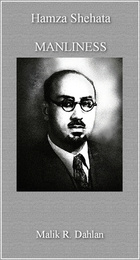
Manliness
Malik R. Dahlan
Haus Publishing, 2016
In 1940, Saudi Arabian intellectual and activist Hamza Shehata (1910–71) gave a lecture at the Makkah Charitable Aid Association. Over the course of four hours, Shehata shared a staggering number of social and cultural observations and critiques on many facets of contemporary life. Translated into English for the first time, Manliness presents that speech for a new generation of readers.
Using a framework that was both scientific and philosophical, Shehata convinced his audience that conventional views of virtue and vice were a deceptive simplification and that social and religious reform was necessary. A humble man at heart, he was reluctant to publish his talk in his lifetime, but thanks to Malik R. Dahlan’s expert translation and insightful discussion of the larger historical and geographical context for the speech, readers are now able to appreciate a fascinating snapshot of Arabian history that would otherwise be lost.
Using a framework that was both scientific and philosophical, Shehata convinced his audience that conventional views of virtue and vice were a deceptive simplification and that social and religious reform was necessary. A humble man at heart, he was reluctant to publish his talk in his lifetime, but thanks to Malik R. Dahlan’s expert translation and insightful discussion of the larger historical and geographical context for the speech, readers are now able to appreciate a fascinating snapshot of Arabian history that would otherwise be lost.
[more]
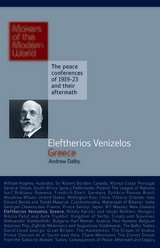
Eleftherios Venizelos
Greece
Andrew Dalby
Haus Publishing, 2010
The Greek Prime Minister Eleftherios Venizelos (1864–1936) was one of the stars of the Paris Peace Conference, impressing many of the Western delegates, already possessed of a romantic view of 'the grandeur that was Greece', with his charm and oratorical style. He won support for his country's territorial ambitions in Asia Minor, the 'Great Idea' of a revived Hellenic empire controlling the Aegean and stretching to the Black Sea. Venizelos had won this support by bringing Greece into the war on the Allied side, but in doing so he had split his country, and in order to secure his government's position he had to deliver territorial gains at the expense of the Ottoman Empire. It was the Greek occupation of Asia Minor, however, that spurred the Turks to support Mustafa Kemal and resulted not in the creation of a Greater Greece but the modern Republic of Turkey. The conflict between Greece and Turkey began the tension between the two states that has continued for the past 90 years and is most clearly seen in the dispute over the divided island of Cyprus. The Paris Peace Conferences were where the modern Near East, with all its problems of competing nationalisms and ethnic divisions, was created, and Venizelos's Greece was the key player in this process.
[more]
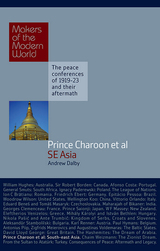
Prince Charoon et al
South East Asia
Andrew Dalby
Haus Publishing, 2010
Southeast Asia needs to be dealt with as a whole, because, although the one national delegation from the region (Siam) took a minor part, nationalist movements in several Southeast Asian countries reached an early climax - significant though inconclusive - in the years 1919-1920. The planned Peace Conference, Wilson's Fourteen Points, and the victory of Communism in Russia, all contributed to this activity, and in spite of national differences it needs to be seen as a whole. The focus of the book will be on developments around 1919; thus it will bring out for the first time the unexpected significance for South-east Asia of the 1919 milestone. It will also have a biographical bias - taking a special interest in the personalities of major figures in this important period, in order to show the influences and the patterns of thought that underlie their activities at the time of the Peace Conference. Following a brief introduction making the link between world events in 1919 and South-east Asia, the book sets the scene in the region. Succeeding chapters deal with the five countries - Siam, Vietnam, Burma, Indonesia, Philippines - in which the years 1919-21 were of special significance, as well as the impact of the peace conferences in relationships with their neighbours, the growth of international Communism and global politics in later years.
[more]
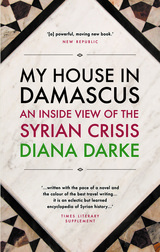
My House in Damascus
An Inside View of the Syrian Revolution
Diana Darke
Haus Publishing, 2014
The ongoing conflict in Syria has made clear just how limited the general knowledge of Syrian society and history is in the West. For those watching the headlines and wondering what led the nation to this point, and what might come next, this book is a perfect place to start developing a deeper understanding.
Based on decades of living and working in Syria, My House in Damascus offers an inside view of Syria’s cultural and complex religious and ethnic communities. Diana Darke, a fluent Arabic speaker who moved to Damascus in 2004 after decades of regular visits, details the ways that the Assad regime, and its relationship to the people, differs from the regimes in Egypt, Tunisia, and Libya—and why it was thus always less likely to collapse quickly, even in the face of widespread unrest and violence. Through the author’s firsthand experiences of buying and restoring a house in the old city of Damascus, which she later offered as a sanctuary to friends, Darke presents a clear picture of the realities of life on the ground and what hope there is for Syria’s future.
Based on decades of living and working in Syria, My House in Damascus offers an inside view of Syria’s cultural and complex religious and ethnic communities. Diana Darke, a fluent Arabic speaker who moved to Damascus in 2004 after decades of regular visits, details the ways that the Assad regime, and its relationship to the people, differs from the regimes in Egypt, Tunisia, and Libya—and why it was thus always less likely to collapse quickly, even in the face of widespread unrest and violence. Through the author’s firsthand experiences of buying and restoring a house in the old city of Damascus, which she later offered as a sanctuary to friends, Darke presents a clear picture of the realities of life on the ground and what hope there is for Syria’s future.
[more]
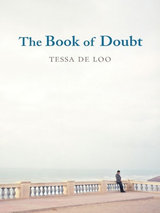
The Book of Doubt
Tessa de Loo
Haus Publishing, 2011
Even though he is the son of a Dutch mother, Saeed has a Moroccan first name in memory of the virtuoso oud player his mother fell in love with twenty years ago. When she found out she was pregnant, he ran off and returned to Morocco. Saeed decides to look for his father, in the hope of finding a new identity in a new world. His childhood friend Hassan accompanies him. Back then they shared an imaginary land which they both ruled. Now they only have one starting point: a grocery shop in Fez. From there they follow the trail of the oud player, who leads them from the cedar woods of Ifrane to the red dunes of the desert to the high Atlas, where Kasbahs are locked in a losing battle with decay. Saeed's search sends him deeper into disillusionment and into the arms of Islam, where he tries to find something to hold on to. But there is a disturbing presence. A seemingly fictitious character from their imaginary past infiltrates Saeed's quest. While Saeed desperately tries to get rid of him, different aspects of his life, more and more beyond his control, reach an apotheosis resulting in one final deed affecting man and beast alike.
[more]
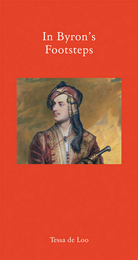
In Byron's Footsteps
Tessa de Loo
Haus Publishing, 2010
When Tessa de Loo saw Albania for the first time, no foreigners were allowed to enter. Filled with a great curiosity, longing, and a sense of wonderment by this isolated land, de Loo gazed toward the mountains that stood like "the backs of patiently waiting elephants" across the water from Corfu. Inspired by the famous Thomas Phillips portrait of Lord Byron in Albanian national costume, and enthralled by the image of Lord Byron since her teenage years, she sets about exploring not only his physical journey, but attempts to understand his inner one as well. de Loo stole her way in and found a country suffering the hardships of post-communist reality and the constant and sometimes fractious clash between tradition and modernity. In the tradition of Bruce Chatwin, de Loo, the award-winning author of The Twins, has written a fascinating travelogue and a very personal reassessment of the a formative chapter in Lord Byron's short life.
[more]
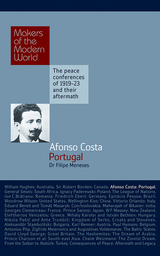
Afonso Costa
Portugal
Filipe Ribeiro de Meneses
Haus Publishing, 2010
Portugal’s poor military performance in the First World War, notably in Africa, restricted Afonso Costa's (1871-1937) ability to secure his diplomatic aims which, in any case, were highly unrealistic. Nevertheless, his loyal press in Portugal described him as the ‘leader of the small nations’, and reported his every statement as a major triumph. Afonso Costa’s most important intervention took place in May 1919, when he denounced the Allies' unwillingness to make Germany pay for all the damage she had caused during the conflict; this speech led to a number of newspaper interviews in which Costa restated his position. The final draft of the Treaty was a complete shock to Portuguese public opinion: It effectively spelt the end of Costa’s political career. This book considers the political implications of Portugal’s participation in the First World War and of the ‘defeat’ in Paris. Reconciliation between the rival parties – and between factions within parties – became impossible, as did, as a result, the formation of a stable cabinet.
[more]
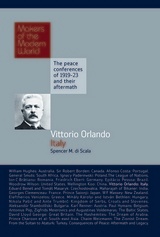
Vittorio Orlando
Italy
Spencer Di Scala
Haus Publishing, 2009
The Italian premier Vittorio Orlando came to Paris as one of the 'Big Four', yet in April 1919 walked out in one of the most dramatic crises of the Peace Conferences. Orlando's failure to win for Italy the territories she felt were owed to her was to have far-reaching consequences for both Italy and Europe as a whole. Italy in 1918 was in an ambivalent position: at the outbreak of war the country had been part of the Triple Alliance with Germany and Austria-Hungary, but had stayed neutral until joining the Allies in 1915 on the promise of territorial rewards. The war was a near-disaster for the Italians, culminating in the collapse of their armies at Caporetto in 1917. It was this crisis that brought Orlando to power, and he did much to restore the situation, but the Italians looked to Versailles to compensate them for the terrible losses they had suffered. In this book, the clash between Italy's territorial demands in the Balkans, which had been guaranteed by the Allies in 1915 and earned through her losses in the War, with the new Wilsonian doctrine of open diplomacy and national self-determination is detailed, and it traces the effects the failure of Orlando's delegation to satisfy their people's demands which directly to the rise of Fascism and to Mussolini's policies in the 1930s as he sought to obtain what Italy had been denied at Versailles.
[more]

Labour's Civil Wars
How Infighting has Kept the Left from Power (and What Can Be Done About It)
Patrick Diamond
Haus Publishing, 2023
A compelling chronicle of the Labour Party’s perpetual internal divisions.
The biblical adage that “if a house be divided against itself, that house cannot stand” remains sound theological advice. It is also essential counsel for any political party that aspires to win elections. When a party is riven with division, the public does not know what it stands for. Though both major UK parties have been subject to internal conflict over the years, the Labour Party has been more prone to damaging splits. The divide exposed by the Corbyn insurgency is only the most recent example in almost a century of destructive infighting. Indeed, it has often seemed as though Labour has been more adept at fighting itself than in defeating the Tory party. This book examines the history of Labour’s civil wars and the underlying causes of the party’s schisms, from the first split of 1931, engineered by Ramsay MacDonald, to the ongoing battle for the future between the incumbent, Keir Starmer, and those who fundamentally altered the party’s course under his predecessor, Jeremy Corbyn.
The biblical adage that “if a house be divided against itself, that house cannot stand” remains sound theological advice. It is also essential counsel for any political party that aspires to win elections. When a party is riven with division, the public does not know what it stands for. Though both major UK parties have been subject to internal conflict over the years, the Labour Party has been more prone to damaging splits. The divide exposed by the Corbyn insurgency is only the most recent example in almost a century of destructive infighting. Indeed, it has often seemed as though Labour has been more adept at fighting itself than in defeating the Tory party. This book examines the history of Labour’s civil wars and the underlying causes of the party’s schisms, from the first split of 1931, engineered by Ramsay MacDonald, to the ongoing battle for the future between the incumbent, Keir Starmer, and those who fundamentally altered the party’s course under his predecessor, Jeremy Corbyn.
[more]
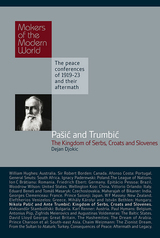
Pasic & Trumbic
The Kingdom of Serbs, Croats and Slovenes
Dejan Djokic
Haus Publishing, 2010
Nicola Pasic and Ante Trumbic: The book will provide the first parallel biographies of two key Yugoslav politicians of the early 20th century: Nikola Pasic, a Serb, and Ante Trumbic, a Croat. It will also offer a brief history of the creation of Yugoslavia (initially known as the Kingdom of Serbs, Croats, and Slovenes), internationally accepted at the Paris Peace Conference of 1919-20 (at the Treaty of Versailles). Such an approach will fill two major gaps in the literature - scholarly biographies of Pasic and Trumbic are lacking, while Yugoslavia's formation is due a reassessment - and to introduce the reader to the central question of South Slav politics: Serb-Croat relations. Pasic and Trumbic's political careers and their often troubled relationship in many ways perfectly epitomize the wider Serb-Croat question.
[more]
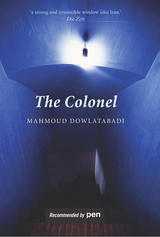
The Colonel
Mahmoud Dowlatabadi
Haus Publishing, 2011
A pitch black, rainy night in a small Iranian town. Inside his house the Colonel is immersed in thought. Memories are storming in. Memories of his wife. Memories of the great patriots of the past, all of them assassinated or executed. Memories of his children, who had joined the different factions of the 1979 revolution. There is a knock on the door. Two young policemen have come to summon the Colonel to collect the tortured body of his youngest daughter and bury her before sunrise. The Islamic Revolution, like every other revolution in history, is devouring its own children. And whose fault is that? This shocking diatribe against the failures of the Iranian left over the last fifty years does not leave one taboo unbroken.
[more]
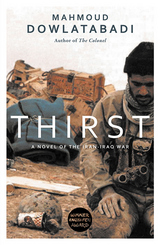
Thirst
Mahmoud Dowlatabadi
Haus Publishing, 2014
Thirst is the latest novel translated into English by award-winning novelist Mahmoud Dowlatabadi. Following the critical success of his acclaimed 2013 novel The Colonel, for which he won the Jan Michalski Prize for Literature, Thirst is profound, humane and mischievous in its humour, shining a light on the madness and the absurdity of a brutal war. On a strategic hill overlooking the frontier, Iraqi and Iranian troops battle for access to a water tank. The troops are delirious with thirst and on the brink of madness. They are, moreover, characters in a novel being written by an Iraqi journalist. That is, if he is given the chance to write it, a chance denied him by an Iraqi major who is in charge of a military prison and who commands the journalist to write a fictitious report about a murder in the camp aimed at demoralising the enemy soldiers. At the same time, on the other side of the border, an Iranian author writes the story of the same troop of soldiers but from an Iranian perspective. He, likewise, is interrupted, not by external forces, but by memories of his first encounter with a gun… Told in a kaleidoscopic style that weaves between the ongoing battle and the struggles of the writer, Thirst is rich with dark humour and surreal images. The emphasis on maintaining humanity and individual identity in the midst of a dehumanising conflict shows, once again, why Mahmoud Dowlatabadi is the most important Iranian novelist writing today.
[more]

Douglas Home
David Dutton
Haus Publishing, 2006
Alec Douglas-Home was an aristocrat who disclaimed his peerage to become Prime Minister in 1963.
[more]
READERS
Browse our collection.
PUBLISHERS
See BiblioVault's publisher services.
STUDENT SERVICES
Files for college accessibility offices.
UChicago Accessibility Resources
home | accessibility | search | about | contact us
BiblioVault ® 2001 - 2024
The University of Chicago Press









